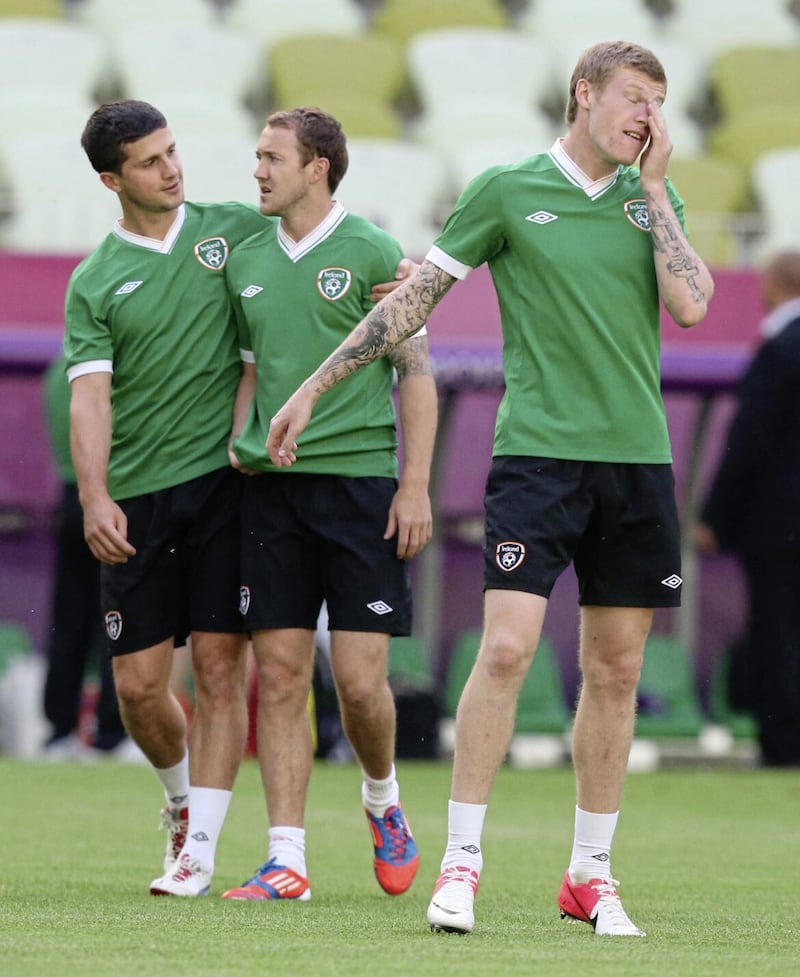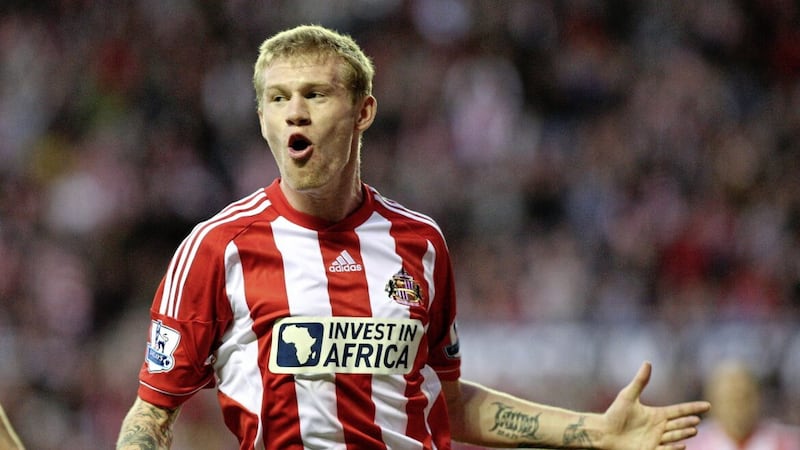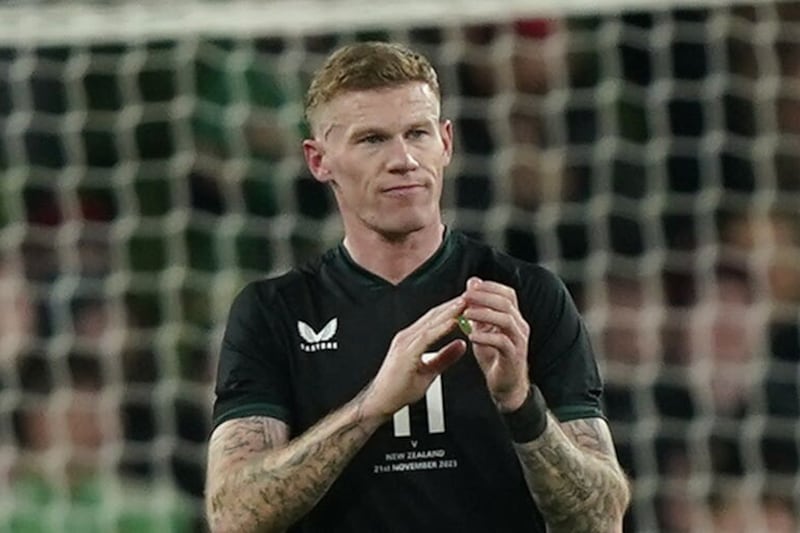On the cusp of the 2012 European Championships with Ireland, Republic of Ireland correspondent Brendan Crossan delved into the incredible career of James McClean. Following today's announcement that he will retire from the international stage next month, here's an archive profile piece of the Derry man before heading to the Euros in Poland and words from some of the people that helped mould him...
EDMOND Carton was known as ‘Wee Gordon’ around the Creggan area of Derry . He founded the Trojans Football Club in 1938. For over 30 years he was the club’s heart and soul.
Edmond Carton died January 28 1972 and was buried on Bloody Sunday.
“Trojans kind of died with him because he ran the club right up to his death,” says Raymond Carton, son of the late Edmond .
“I was 20-years-old when I was approached by a few young kids in the street about starting up a football team again.
“It was sort of a tribute to my father to resurrect Trojans.”
Trojans resurfaced in 1975 with an U13 team from the Iniscarn Road area.
Creggan's sprawling housing estate is recognised as one of the most socially deprived areas in Ireland and Britain with a notoriously high unemployment rate.
“No matter what way you want to go to Creggan, you’ve got to go up a hill!”
Before acquiring the council-owned site of Oakland Park in recent years, the ever-expanding Trojans Youth Club used to train on the Bishop’s Field.
“Football was everything to the kids,” says Carton.
James McClean lived in Creggan Heights and came from a family of five - two brothers and two sisters.
Like most of his peers, McClean joined the Trojans club around the age of nine.
“He was a very quiet young fella,” remembers Carton, “never any bother with young James. He turned up regularly for his training and loved his football.
“He wouldn’t be out at the front of the crowd or outgoing.”
Carton, who continues to run the Trojans club today, doesn’t sugar-coat his memories of the shy kid from Creggan Heights .
“The team that James played in was a decent wee side but nothing special. They didn’t win anything or do anything spectacular.
“I have to be honest, and I’ve said this to James, he wasn’t a stand-out footballer as a young player,”
“There were other players in his age group that were better than him.”
Trojans coach Gerry Colhoun looked after McClean’s age group until they moved up to U15 and U16 level where Carton worked.
“I could see then that he had definitely improved. Physically, he was developing too because he was quite small when he was young.”
Carton played McClean on the left side of midfield and occasionally in central midfield.
By the time he reached U16 level, McClean was displaying all the traits that would see him make the breakthrough at Derry City and Sunderland .
Although he’d made gradual improvements, the well-worn pathway to Derry City that many Trojans graduates took wasn’t open to McClean at that stage.
After eight happy if unremarkable years at Trojans, McClean decided to carve his own path.
He tried to make a go of it in the Irish League with Institute, but left after a couple of weeks.
Still just 17, he made one appearance for Liam Beckett’s ‘Stute side against Glentoran at The Oval in 2007.
He returned to his roots and finished the season out with Trojans' adult team, also managed by Carton, in the Derry & District League.
The Trojans coach noticed further improvement in the shy teenager, enough for him to be given a chance with Derry City ’s U21 side.
“You always got the impression there was a bit more there – if he’d push himself a bit more there was more in his tank,” Carton reflects.
“But I believe the greatest credit must go to Derry City because they brought James out of himself. You could really see the improvement then.”
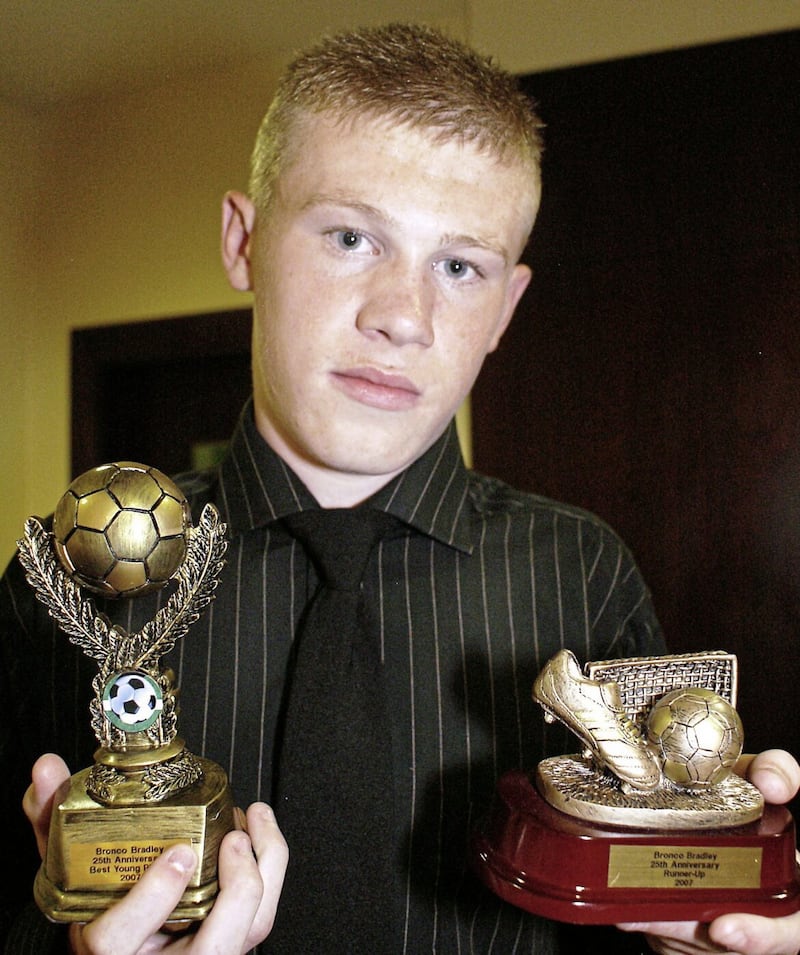
Former Derry City manager Stephen Kenny recalls: “I just got back from Scotland [ Dunfermline ] at the start of the 2008 season.
“James would have been with our U21s. He was quite raw and looked like somebody that had potential. A lot of people thought he might have been a left-back; a lot of people had the view that he wasn’t a winger at all. I felt he was definitely a left winger.”
Carton recalls: “Stephen Kenny came along to one of Trojans’ presentation nights and he said to me: ‘Raymond, have a word with James. We know he’s got the ability. He just needs to believe in himself a bit more.’”
McClean’s first team graduation at the Brandywell came against Bohemians in a League Cup match in the 2008 season.
McClean made the familiar 20-minute walk from his Creggan Heights home down to Brandywell. Kenny didn’t tell him he would be playing until he arrived at the ground.
“James was a late starter,” remembers Derry City captain Barry Molloy.
“There were boys in training with us when they were 15 and 16 and you could see them doing well for themselves. But James wasn’t in with us until he was about 18.
“He made his debut at the Brandywell in the League Cup against Bohs and he was absolutely brilliant, and he scored as well.”
Kenny recalls: “We’d built a good team before I went to Scotland and when I came back we had a good start to that season.
“We had Paddy McCourt and Niall McGinn. Halfway through that year Paddy went to Celtic and Niall also got a move at the end of that year."
McClean, as a result, got more game-time and by the end of the season his market value had steadily climbed, so much so that several English clubs became interested in Derry’s rough diamond.
Disaster, though, lurked just around the corner for Derry City .
The club was relegated to the First Division when the FAI discovered that "dual contracts" had been used by the Brandywell club and the demotion led to the release of the playing staff from their contracts.
The Derry City Board of Directors resigned and a new Board began plotting a way out of the financial quagmire it found itself in by promoting local players to the first team.
Stephen Kenny was sufficiently inspired by the new crop of players that he decided to stay.
Around that time, Derry were on the verge of losing McClean to Lincoln City .
“I rang James and he said: ‘ Lincoln want me to sign.’
I said: ‘Okay, if you’re happy enough to do that – but I’m just letting you know that I’m staying on and it wouldn’t harm your development if you wanted to come back. We’ll train every day like we had done before, even though we weren’t full-time any more.’
“He said: ‘If you’re staying on I’ll definitely come back and give it a go’. James came back and he really developed.”
Kenny doesn’t subscribe to the view that without the financial crisis at Derry City in 2008 and ’09 McClean would not have emerged as quickly as he did.
“Players like James McClean and Patrick McElheney would have made it in any Derry team,” he says.
It may only have been the modest First Division ranks, but McClean flourished that season alongside many of his friends he’d played with at the U21s.
If 2009 was McClean's breakthrough season, his career would soar in 2010 and '11.
The self-doubts and expressed reticence that punctuated his teenage years were finally shed.
A non-smoker and non-drinker, it’s well known McClean’s only vice while at his local club was his obsession with football boots.
“McClean has more pairs of football boots than any man alive,” says The Derry Journal’s respected Sports Editor Arthur Duffy.
“He didn’t spend his money on anything else,” Kenny says. “His boots were special to him! He bought boots every single week.”
“James lives for football,” says Molloy. “When he came into the first team and started earning a wee bit of money, all he would buy was football boots.
“You could never talk to James. He just kept buying them.
“He thought: ‘If I feel good, I play good’ – and to be honest it worked for him."
After one season away, Derry City returned to the top flight.
To bolster their chances in the Premier Division, Kenny signed striker Eamon Zayed from Sporting Fingal.
Arthur Duffy recalls: “I remember speaking to Eamon Zayed in our first interview and I told him: ‘You’ll score over 20 goals for Derry this season because of the two lads you will be playing with – James McClean and Patrick McEleney – they’ll put the ball wherever you want it’.”
Zayed finished the league’s top scorer with 26 goals and scooped the PFAI's Players' Player of the Year Award.
Most opposing full-backs in the Premier Division were left bewildered by McClean’s raw pace and power.
Prior to his meteoric rise, highly-respected IFA coach Alfie Wylie was equally bewildered by the absence of James McClean’s name on Northern Ireland’s underage teams.
“You have to understand that James wasn’t capped at any level,” says Kenny.
“He went to St. Peter’s in Creggan and a lot of players in his class were capped by Northern Ireland at schoolboy level and a good few had been capped by the Republic of Ireland ’s U18s. James wasn’t one of them.
“At that stage, Alfie Wylie said [to the IFA]: ‘You’ve got to pick him in your squad. Some players are being picked and they’re no-where near their first team and this guy’s the real deal.’
“James played for Northern Ireland in the Milk Cup and he went straight into the U21s. And then they dropped him for a long period and he wasn’t seen for a good while after that.”
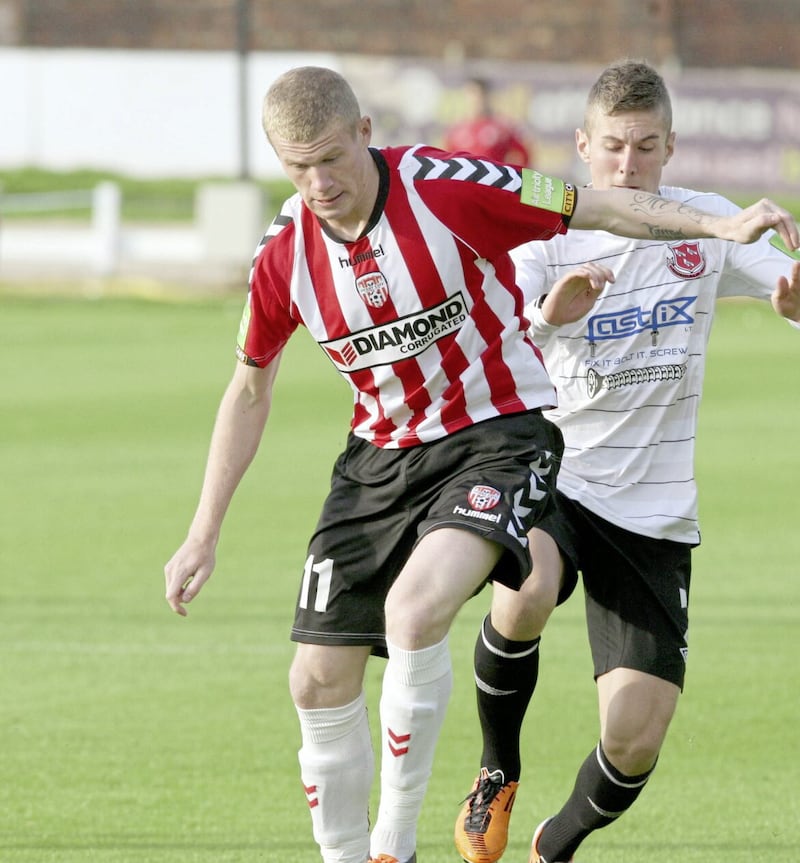
Despite this lengthy absence from their team-sheets, McClean was apathetic about playing for the North.
In an interview in February of this year, the player said: “I think people need to understand that I grew up a Republic of Ireland fan. I’m from Derry , it is quite a nationalist area and my dream was always to play for the Republic… [Playing for Northern Ireland ’s U21s] was to help my career progress further.”
He played seven times for the North's U21s.
At that stage, McClean's primary focus wasn't international honours but to seal a move across the water.
Word had spread in England like wild-fire of Derry ’s latest rising star.
Leicester City and Brighton were keen to sign him, Wigan manager Roberto Martinez spoke to Kenny on a number of occasions and Swansea watched the left-winger “five or six times”.
A deal was within touching distance with Peterborough until some last-minute haggling from Barry Fry saw the move collapse.
But McClean wouldn't be short of offers.
Bryan ‘Pop’ Robson had alerted Niall Quinn when he was appointed Sunderland's chief scout after Quinn poached him from Chelsea . Robson told Quinn that Chelsea opted not to go for McClean despite the fact that it was for “little money”.
Quinn took ‘Pop’ Robson’s advice and signed McClean for a snip at £350,000 last August.
“I’d spoken to Pat Devlin at Bray who was close to [Kenny] Dalglish at Liverpool," says Kenny, "because I thought he was good enough to go to Liverpool but Sunderland came in with a bid and the club accepted it.”
The deal was perfect for both player and club. But it was only when Martin O’Neill replaced Steve Bruce at the Stadium of Light in December 2011 that the humble kid from Creggan Heights truly made it onto the big stage.
“Steve Bruce had him on the bench but opted not to use him,” says Duffy. “Lo and behold, Saint Martin [O’Neill] arrives at Sunderland and James hasn’t looked back.”
It took a while for McClean to appear on Republic of Ireland manager Giovanni Trapattoni's radar, but once he registered, it didn’t take much to persuade the conservative Italian.
One look at him during February’s friendly against Czech Republic and ‘Trap’ was convinced of McClean’s value.
“What he was doing for us in the [League of Ireland ] First Division, he was doing in the English Premiership,” says Molloy.
When the Republic of Ireland were playing their first Euro 2012 qualification game in Armenia September 3 2010, McClean was sitting in a Waterford hotel preparing for a game with Derry City.
Fast-forward 20 months and the 23-year-old is part of the Republic’s Euro 2012 squad in Poland .
James McClean is a fairytale story.
There were many forks in the road along the way and it was never obvious he was going to make it.
“James has great humility,” says Kenny. “He’s very proud to be from Derry . He understood what it took to be a good footballer.
“Self-belief and confidence is important and he was never blessed with loads of it. He’s just quite shy…When he realized his ability he just got better and better.”
The Trojans club bought a new mini-bus with some of the money that they received from McClean’s Sunderland move and a group of kids will head to California for a tournament this summer.
“James is a great role model,” says Carton. “We talk to our young kids that play with us now and we tell them about James.
“We tell them: ‘James didn’t win many Player of the Year awards with us; he wasn’t a stand-out player. But look at him now. Look at what he’s done through commitment and dedication.’
“It’s a great thing to be able to say to the kids. It’s about how much you want it and how much you’re going to push yourself. To me, that’s the legacy that James has left at Trojans.”
